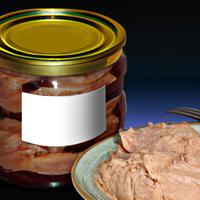
1 serving (100 grams) contains 116 calories, 25.5 grams of protein, 0.8 grams of fat, and 0.0 grams of carbohydrates.

Log this food in SnapCalorie

Nutrition Information
Calories |
276.2 | ||
|---|---|---|---|
% Daily Value* |
|||
| Total Fat | 1.9 g | 2% | |
| Saturated Fat | 0.5 g | 2% | |
| Polyunsaturated Fat | 0 g | ||
| Cholesterol | 90.5 mg | 30% | |
| Sodium | 683.3 mg | 29% | |
| Total Carbohydrates | 0 g | 0% | |
| Dietary Fiber | 0 g | 0% | |
| Sugars | 0 g | ||
| protein | 60.7 g | 121% | |
| Vitamin D | 92.9 mcg | 464% | |
| Calcium | 23.8 mg | 1% | |
| Iron | 3.1 mg | 17% | |
| Potassium | 564.3 mg | 12% | |
* Percent Daily Values are based on a 2,000 calorie diet. Your daily values may be higher or lower depending on your calorie needs.
Food Attributes
Source of Calories
About Tuna canned in water
Tuna canned in water is a popular pantry staple known for its versatility and nutritional benefits. Typically made from skipjack or albacore tuna, this product is preserved in water with added salt or sometimes with no additional ingredients for a low-calorie option. Originating from global seafood practices, canned tuna is commonly used in Western, Mediterranean, and Asian cuisines, appearing in dishes like salads, sandwiches, casseroles, and sushi rolls. Rich in protein, canned tuna is an excellent source of omega-3 fatty acids, which support heart and brain health. It also provides essential nutrients such as vitamin D, selenium, and B vitamins. While its low-fat content makes it a lean protein choice, consumers should be mindful of sodium levels and mercury content, particularly when consumed frequently. Opting for brands with sustainable fishing practices can also contribute to environmental health.



